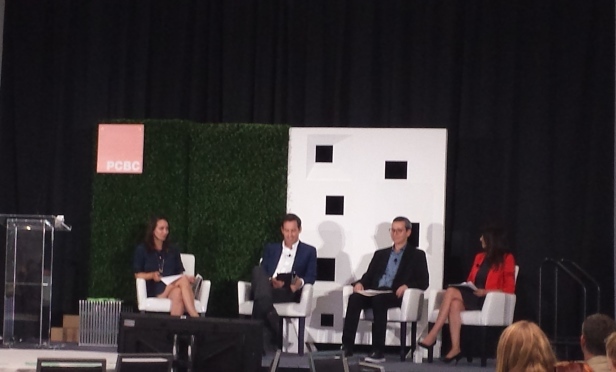 Yaussi, Haughey, Yasukochi and Thibodeau (L to R) discuss tech disruption in multifamily at PCBC last month.
Yaussi, Haughey, Yasukochi and Thibodeau (L to R) discuss tech disruption in multifamily at PCBC last month.
SAN FRANCISCO—With unprecedented new investment in real estate technology and revolutionary tech moving into the mainstream, the multifamily industry is poised to experience changes that will shape multifamily design, development, marketing, sales and resident experience. So said experts at Pacific Coast Builders Conference held late last month at Moscone.
A tech session offered insights from new research from National Multifamily Housing Council that evaluates a variety of technologies, including artificial intelligence, blockchain, the Internet of Things, and virtual and augmented reality along the lines of funding, development, adoption, and business impact. The moderator was Rick Haughey, vice president of industry technology initiatives with NMHC, along with panelists Colin Yasukochi, CBRE director of research and analysis; Laure Thibodeau, senior regional property manager with Lennar Multifamily Communities and Sarah Yaussi, vice president of business strategy with NMHC.
“CIOs say tech capital coming in is a really big deal,” Haughey said.
Yasukochi concurred, saying it will only get bigger with younger generations and keeping things flexible is important.
Thibodeau said indeed tech innovations are affecting all of the industry as these concepts disrupt multifamily in enterprise management, finance, operations, construction, marketing and resident services. Tech's impact on functional areas is most apparent in the areas of property operations, business intelligence, redevelopment and construction, finance and enterprise management. Of these, most score high or moderate in terms of importance, with most industry experts chiming in that tech's impact on these functional areas is occurring now or will be soon.
“We need to work through the integration with property management, getting employees to adopt, make the business case for tech and address pain points,” Haughey said.
Tech's influence is such a sure thing that Foster Research indicates there will be $1.2 billion invested in artificial intelligence by 2020. Moreover, McKinsey estimates a potential economic impact including consumer surplus of as much as $11.1 trillion per year in 2025 for Internet of Things applications. General Motors and Ford have each invested $1 billion in autonomous vehicles. And, by 2023, the size of the virtual reality industry will be $34 billion and the size of the augmented reality industry will be $60 billion, according to Markets and Markets.
But, Thibodeau asked, is that the only price being paid?
“We need to be sure we don't lose human touch,” she pointed out.
Or lose jobs, which could happen in the worst-case scenario, where 800 million jobs may be lost to artificial intelligence/robotics, says McKinsey.
© 2025 ALM Global, LLC, All Rights Reserved. Request academic re-use from www.copyright.com. All other uses, submit a request to [email protected]. For more information visit Asset & Logo Licensing.








